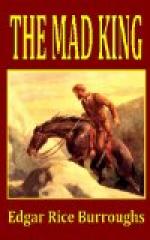Quick though Barney was to reach the bomb and extinguish the fuse, Maenck had disappeared before he returned to search for him; and, though he roused the gardener and chauffeur and took turns with them in standing guard the balance of the night, the would-be assassin did not return.
There was no question in Barney Custer’s mind as to whom the bomb was intended for. That Maenck had hurled it toward the house after Barney had seized him was merely the result of accident and the man’s desire to get the death-dealing missile as far from himself as possible before it exploded. That it would have wrecked the house in the hope of reaching him, had he not fortunately interfered, was too evident to the American to be questioned.
And so he decided before the night was spent to put himself as far from his family as possible, lest some future attempt upon his life might endanger theirs. Then, too, righteous anger and a desire for revenge prompted his decision. He would run Maenck to earth and have an accounting with him. It was evident that his life would not be worth a farthing so long as the fellow was at liberty.
Before dawn he swore the gardener and chauffeur to silence, and at breakfast announced his intention of leaving that day for New York to seek a commission as correspondent with an old classmate, who owned the New York Evening National. At the hotel Barney inquired of the proprietor relative to a bearded stranger, but the man had had no one of that description registered. Chance, however, gave him a clue. His roadster was in a repair shop, and as he stopped in to get it he overheard a conversation that told him all he wanted to know. As he stood talking with the foreman a dust-covered automobile pulled into the garage.
“Hello, Bill,” called the foreman to the driver. “Where you been so early?”
“Took a guy to Lincoln,” replied the other. “He was in an awful hurry. I bet we broke all the records for that stretch of road this morning—I never knew the old boat had it in her.”
“Who was it?” asked Barney.
“I dunno,” replied the driver. “Talked like a furriner, and looked the part. Bushy black beard. Said he was a German army officer, an’ had to beat it back on account of the war. Seemed to me like he was mighty anxious to get back there an’ be killed.”
Barney waited to hear no more. He did not even go home to say good-bye to his family. Instead he leaped into his gray roadster—a later model of the one he had lost in Lutha—and the last that Beatrice, Nebraska, saw of him was a whirling cloud of dust as he raced north out of town toward Lincoln.
He was five minutes too late into the capital city to catch the eastbound limited that Maenck must have taken; but he caught the next through train for Chicago, and the second day thereafter found him in New York. There he had little difficulty in obtaining the desired credentials from his newspaper friend, especially since Barney offered to pay all his own expenses and donate to the paper anything he found time to write.




